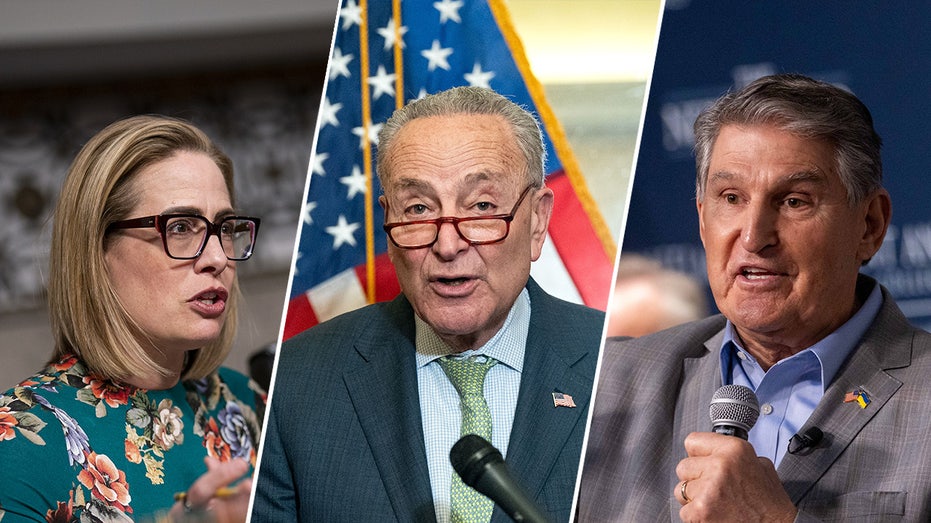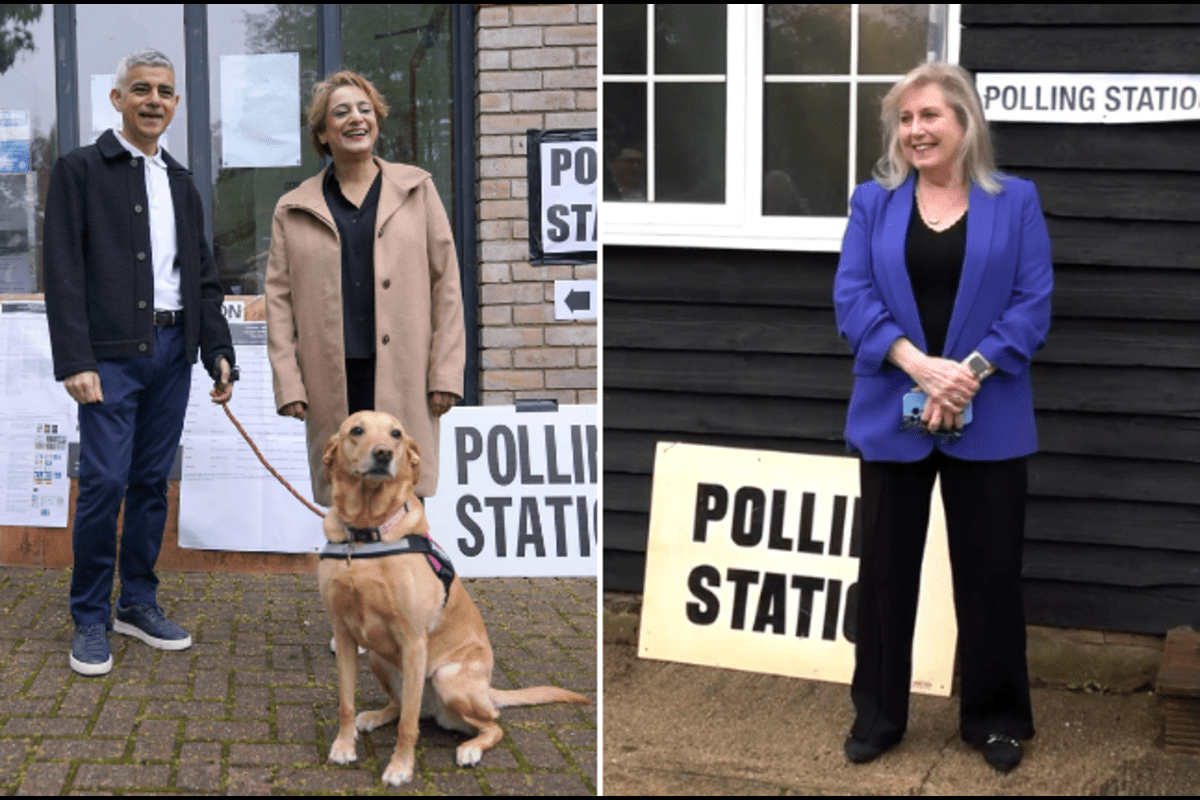Balance of power: Filibuster fate could come down to 2024 Senate elections
The Senate Democrats may have enough votes to alter the filibuster if they hold onto the majority after the November elections.

The Senate's filibuster could be at risk if Democrats retain the majority after the 2024 elections, with the exit of two staunch defenders of the tool in Sens. Joe Manchin, D-W.Va., and Kyrsten Sinema, I-Ariz.
"It would be on the table," Jim Kessler, former senior aide to Majority Leader Chuck Schumer, D-N.Y., told Fox News Digital.
But, he said, "I'm skeptical that it gets done."
"If Senate Democrats maintain control of the majority, we should expect another push to railroad over the long-respected filibuster, because Senators Manchin or Sinema won’t be there to stop it," said Republican strategist Ron Bonjean, former top spokesman to Senate Majority Leader Trent Lott and former chief of staff of the Senate Republican Conference.
RUBIO DEMANDS COLUMBIA PRESIDENT REFUND STUDENTS AFTER TAKEOVER BY ‘LAWLESS, PRO-HAMAS RIOTERS’
Both Manchin and Sinema announced they would not be seeking re-election.
According to Kessler, there wasn't ever truly enough support among Democrats to do away with the filibuster altogether. "There was a lot more of smoke than fire on this," he claimed.
Many blamed Manchin and Sinema for blocking reform to the filibuster in its current incarnation. But the veteran Democratic aide suggested there were more skeptical members of the caucus — and they used the two renegade lawmakers as a shield of sorts. "It allowed them not to say anything if they were skeptical," he explained.
While Kessler wouldn't reveal any current senators who might be opposed to completely ending the practice, he noted that late former Sen. Diane Feinstein of California, who was often described as an institutionalist, would likely have been against any such move.
"It would be the saddest day in the history of the United States of America," if Democrats successfully ended the filibuster, Manchin told Fox News Digital.
BIDEN ADMIN SLAMMED FOR 'DOUBLING DOWN' ON ALLEGED GAZA REFUGEE PLANS
"I believe it would be the saddest day in America, and it would be on their shoulders. If they get rid of the filibuster, they've got rid of democracy and what this country is all about," he added.
Sinema's office did not provide comment to Fox News Digital.
Elimination of the filibuster altogether is likely improbable, Kessler said. However, "That's not to say there won't be some rule changes that might affect the filibuster," he noted.
In 2022, Democrats sought to re-institute what is known as the "talking filibuster," which had been standard practice for most of the 20th century up until the 1970s. Reforms put in place at that time allowed for senators to stall bills without the staple marathon speeches on the chamber floor that are often associated with filibusters.
The reform would have effectively allowed Democrats to proceed to a final vote on legislation without 60 senators agreeing in a procedural vote to end debate. If enacted, they would have been able to pass a bill with just a simple majority after a set period of debate.
By a vote of 48-52, the change was rejected. Manchin and Sinema joined the 50 Senate Republicans.
Democrats were becoming desperate to find a way around their Republican colleagues in order to pass a voting rights bill. "Even if you think the filibuster is a good thing, isn’t protecting voting rights and preventing their diminution more important?" Schumer asked at the time, according to Politico.
SCHUMER-BACKED BORDER BILL FAILS A SECOND TIME WITH EVEN LESS DEM SUPPORT
Re-instituting the talking filibuster would put significant pressure on those trying to delay consideration of a bill, once again requiring that a lawmaker be on the floor and speaking at all times. President Biden gave the reform his seal of approval at the time, which would notably help advance his legislative priorities.
"I don't think that you have to eliminate the filibuster, you have to do it what it used to be when I first got to the Senate back in the old days," he said in a 2021 ABC News interview. "You had to stand up and command the floor, you had to keep talking."
Speaking with Fox News Digital, even the most vulnerable Democrats in the November elections are on board to take up such a reform again if they hold on to the majority.
"I would certainly support that sort of reform," Sen. Tammy Baldwin, D-Wis., said. The senator is up for re-election in swing state Wisconsin.
Sen. Bob Casey, D-Penn., who is also in a competitive race in the battleground of Pennsylvania, said he hopes to "vote again on the 60-vote rule," in reference to the reform. "It would be preferable that we get another vote."
VISA BANS FOR ICC OFFICIALS URGED BY BIPARTISAN SENATORS AFTER ISRAEL ARREST WARRANT REQUESTS
According to a spokesperson for Sen. Jon Tester, D-Mont., "Senator Tester does not support ending the filibuster."
The red-state Democrat is embroiled in perhaps the most competitive election in the country.
However, "He supports a talking filibuster that would protect the rights of the minority party and force folks to explain to the American people why they’re holding something up," the spokesperson said, putting Tester in agreement with the two other incumbent Democrats.
Sens. Jacky Rosen, D-Nev., and Sherrod Brown, D-Ohio, did not provide comment to Fox News Digital. They both also face difficult swing-state elections in November.
Schumer's office did not provide comment to Fox News Digital about whether reforming the filibuster would be a priority if Democrats retain the majority.
BIDEN OUTPACES TRUMP WITH 200 CONFIRMED JUDGES, CEMENTING IMPACT ON COURTS
Grant Reeher, a political science professor at Syracuse University, explained that if Democrats were to possess enough votes to make such a reform, they "would still have some good reasons to pause over this."
According to Reeher, Republicans are likely to see the Senate majority in the near future, granting them the same benefits this change affords to the Democratic majority. "It’s quite conceivable that Democrats could change the rule, only to lose the majority in the next midterm or the subsequent presidential election, especially if Republicans can get their act together," he said.
"It would be hard for me to see the return for Democrats, versus the risk," Reeher added.
This was also noted by Kessler, who said, "the other team gets to play with this rule."
One argument Kessler recalled from Democrats in the Senate was that "if we don't do it, Republicans are going to do it — they're going to do it first."
He further predicted "enormous pressure" on the next Senate Republican majority leader to eliminate the filibuster, remarking that Senate Minority Leader Mitch McConnell, R-Ky., never would have done so.
Bonjean warned that if Democrats manage to railroad the "long-respected" filibuster, a "liberal agenda" will be "rammed through the chamber."
"The Senate will be quickly on its way to becoming another House of Representatives," he claimed.
While Democrats could have the ability to change the filibuster if they're in the majority in the next Congress, holding onto it in the November elections could prove difficult. Senate Democrats face one of the most challenging electoral maps in years, with five incumbents up for re-election in swing states across the country. Seven of the most competitive Senate races this cycle are for seats currently held by senators who caucus with the Democrats, according to non-partisan political handicapper the Cook Political Report.



